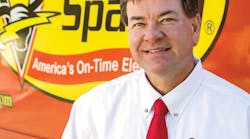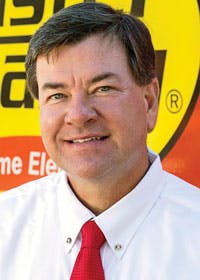How many times have you heard “If we only had good help,” or “I can’t find any electricians?” Industry numbers show that for every three electricians who retire, only one enters the electrical industry. This is a serious issue we must address quickly. Here are some cause-and-effect examples that may make this clearer:
The four-year university
The university system is an important part of our educational system, but, according to SimpleTuition, only about 10% of high school students need or can afford a university education. Yet educators and guidance counselors are trained to educate our youth down this path. So what about the other 90%?
Vocational training
The other 90% of high school students are probably best suited for vocational training or a curriculum geared toward the service industry. Not many years ago, most high schools had some type of vocational classes. Today, many high schools have eliminated these classes, so students aren’t exposed to skilled trade opportunities.
Current trade education
In the United States, the largest trade educator is the prison system. Yes, you read that right. The majority of high school students graduate with less exposure to the skilled trade career path than in previous years, according to the National Education Association. A percentage of our youth goes out on the streets, gets into trouble, and winds up in prison — where they are first exposed to vocational courses. For this reason, we must introduce children to these programs early. The purpose of education is to teach individuals to be productive members of society and support themselves. I think we’ve lost that point somewhere along the way.
Our current economy
According to the Bureau of Labor Statistics (Table 2.1 Employment by Major Industry Sector), America is largely becoming a service economy. Think about your friends and the type of work they do. More than likely, they have a service-related job. So why are we not training in the service economy? It’s mainly because too much focus is on the four-year university system of education. Many college and university graduates are actually overeducated for the jobs that are available. I know this because I see the applicants, their education, and many times the cost associated with that education.
No robots yet
Unlike manufacturing jobs, the skilled trades have not been outsourced to robots. It still takes a human to run wiring in a home or business, repair a burnt panel, or change a breaker. This is a great opportunity for our electrical trade because we can still use our hands for the work being performed.
So what can we do? As an industry, we have to constantly recruit others to join the electrical trade. It’s not the responsibility of the county, state, or federal government to do this. It’s up to us. Here are some recommendations:
- Go to your local middle and high schools and speak about the electrical field. Talk about your company, the pay employees can receive, and the benefits offered. This may be the first and only time they’ll hear about the electrical trade. If you’re a field electrician or helper, take some of your electrical tools with you, and tell the kids how you use them each day.
- Talk about your job in the electrical industry in front of organizations or groups, such as Boy Scouts, Rotary Club, Chamber of Commerce, etc. Most of these organizations are always looking for topics and speakers.
- Reach out to your local community college or trade school, tell them you are available to speak, and say that you are hiring.
We have to create our own electricians of the future. We can’t depend on others to do it for us. I’m calling on everyone in our electrical industry to help with this. We can do it, but we all have to pitch in and teach.
Wise holds an A.S degree in Electrical Engineering and is licensed in N.C., S.C., and Virginia. In addition to being a college electrical instructor, N.C.-licensed real estate broker, and former NASCAR race car driver, Wise owns and operates Mister Sparky in Charlotte and Cherryville, N.C. He can be reached at [email protected].




